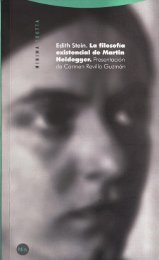The Collected Works of EDITH STEIN ON THE PROBLEM OF EMPATHY
Create successful ePaper yourself
Turn your PDF publications into a flip-book with our unique Google optimized e-Paper software.
77><br />
68 Edith Stein<br />
participate in" the movement <strong>of</strong> knocked and knockinq ball. -fhe<br />
character <strong>of</strong> the ball otherwise prohibits the attribution <strong>of</strong> represented<br />
alive movement to it.eo<br />
On the other hand, rigid immobility conflicts with the phenom_<br />
enon <strong>of</strong> the sensitive living body and the living orgarrism in general.er<br />
We cannor imagine a completely immobtle living being.<br />
That which is bound ro one place completely motionless ls<br />
"turned to stone." So far, spatial orientation cannot be com_<br />
pletely separated from voluntary mobility. First <strong>of</strong> all, the varie_<br />
ties <strong>of</strong> perception would become so limited if spontaneous movement<br />
ceased that the constitution <strong>of</strong> a spatial world (so far, the<br />
individual one) u'ould become dubious. This abolishes rhe pos_<br />
<strong>of</strong> transference<br />
libility<br />
into the foreign living body and so <strong>of</strong> a<br />
fulfilling emparhy and the gaining <strong>of</strong> his orieniation. Thus voluntary<br />
movement is a part <strong>of</strong> the strucrure <strong>of</strong> the individual and is<br />
entirely nonsuspendable.<br />
(i) <strong>The</strong> Phenomena <strong>of</strong> LW<br />
Now let us consider a group <strong>of</strong> phenornena that participate in<br />
the structure <strong>of</strong> the i'dividual i. a special way: the y appeai i. the<br />
living body and also as psychic experiences. I u,ould iike to calthem<br />
the specific phenomena <strong>of</strong> life. <strong>The</strong>y include gro\r,rh, devel_<br />
opment and aging, health and sickness, vigor and sluggishness<br />
(general feelings, in our terms, or, as Scheler would say, ;feeling<br />
ourselves to be in our living body"). As he has protesred againsi<br />
empathy in general, Scheler has very parricularly protested<br />
against "explaining" phenomena <strong>of</strong> life by empathy.ez He wor.rld<br />
be e.tirely justified if empathy were a genetic process so rhat the<br />
elucidation <strong>of</strong> this tendency explained away what it was ro eluci_<br />
date, as we mentioned earlier. Otherwise, I see no possibilitv <strong>of</strong><br />
detaching the phenomena <strong>of</strong> life from the individuai's other ionstituents<br />
or <strong>of</strong> exhibiting anything but an empathic comprehension<br />
<strong>of</strong> them.<br />
In considering general feelings as our own experience, we have<br />
seen horv they "fiIl" the living body and rhe soul, horv they defi_<br />
nitely color every spiritual act and every bodily evenr. horv they<br />
are then "co-seen" at the living bodyjust as fields <strong>of</strong> sensation are.<br />
'I'hus, bl his walk, posture, and his every ntovement, \{e also<br />
Constitution <strong>of</strong> the Psycho-Physical IndiaiduaL 69<br />
"see" "how he feels," his vigor, sluggishness, etc. We bring this<br />
c.o-intended foreign experieuce to fulfillment by carrying it out<br />
nith him empathically. Furthermore, we not only see such vigor<br />
and sluggishness in people and animals, but also in plants. Empathic<br />
fulfillment is also possible here. Of course, what I comprehend<br />
in this case is a considerable modification <strong>of</strong> my own life. A<br />
plant's general feeling does not appear as the coloring <strong>of</strong> its acts,<br />
lirr there is no basis at all to believe such acts are present. Neither<br />
do I have any right to ascribe an "awake" "I" to the plant, nor a<br />
reflective consciousness <strong>of</strong> its feelings <strong>of</strong> life. Even the otherwise<br />
larniliar constituents <strong>of</strong> animals are absent. lt is at least doubtful<br />
rvhether the plant has sensations,e3 and so our empathy is unjusti- <br />
{red if we believe we are inflicting pain on a tree by cutting it<br />
don'n with an ax. A plant is not the center <strong>of</strong> orientation <strong>of</strong> the<br />
spatial world either, nor voluntarily mobile, even though it is<br />
capable <strong>of</strong> alive movement in contrast with the inorganic. On the<br />
other hand, the abse nce <strong>of</strong> this constitution does not justify us in<br />
interpreting what is present in a new way and distinguishing the<br />
phenomena <strong>of</strong> life in plants from our own. I would not like to<br />
<strong>of</strong>fer an opinion on whether we should look at the phenomena <strong>of</strong><br />
life as essentially psychic or only as an essential basis for psychic<br />
existence fDaseins).sa That phenomena <strong>of</strong> life have an experiential<br />
character in psychic contexts is hardly contestable.<br />
No*' perhaps someone will think that I have selected general<br />
feeling as a very convenient example <strong>of</strong> the psychic nature <strong>of</strong><br />
phenomena <strong>of</strong> life. Horvever, this psychic nature must also be<br />
demonstrable in other phenomena <strong>of</strong> life. Scheler has himself<br />
directed us to the "experience <strong>of</strong> life."e5 First calling "lived,"<br />
isolated, finished experiences "psychic," as he does, seems to me<br />
like a definition not derived from the essence <strong>of</strong> the psychic. <strong>The</strong><br />
psychic entity present (the primordial one, according to us) is<br />
rvhat is becoming, is experience. What became, rvas lived, and is<br />
{rnished sinks back into the stream <strong>of</strong> the past. We leave it behind<br />
us when we step into new experience; it loses its prirnordiality but<br />
remains the "same experience." First it is alive and then dead, but<br />
not first non-psychic and then psychic. (<strong>The</strong>re is no positive ternr<br />
fbr "non-psychic.")Just as solidifying u'ax is first liquid and then<br />
hard but still wax, so the same material body remains. <strong>The</strong>re is no

















